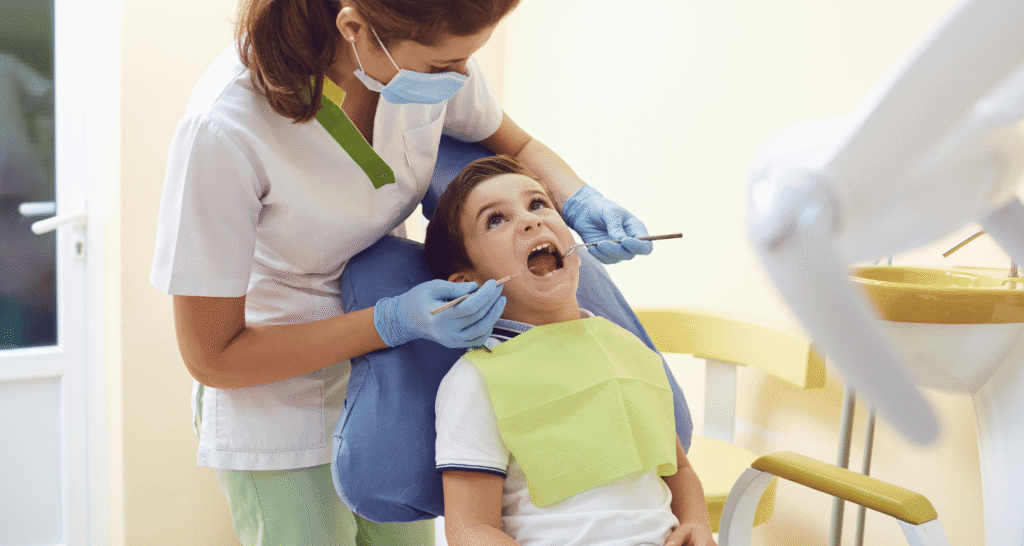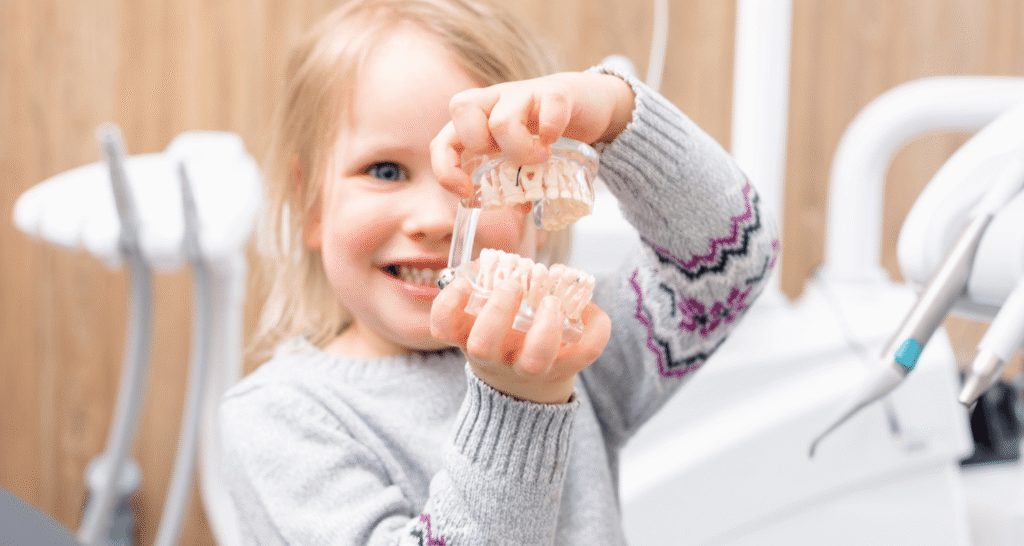Pediatric Dental Checkups: Building Lifelong Oral Health from the Start
You should start taking care of your child’s teeth earlier than you believe. Pediatric dental checkups are not just for discovering cavities. These visits guide general health and facilitate the formation of lifetime habits. The sooner you start, the higher the probability of your child having the best teeth. Comfort and trust are also developed through regular visits. At Dental Faith, our dental practice, we focus on preventing and comforting your child while promoting long-term health. The healthy smile starts with knowledge, keenness, and timely consultations.
Why Do Pediatric Dental Visits Matter?
Childhood visits to a dentist contribute significantly to future dental behavior. You may think that brushing your teeth at home is sufficient, yet it is just one side of the picture. Routine examinations at the pediatric level help identify complications at an early stage of detection and treatment, and provide medical services that your child may not receive at home. Experiences at such an early age can profoundly influence the way your child thinks about dental care for the rest of their life.
How Does Preventive Care Help Your Child?
Brushing is not the only element of prevention. It involves preventing dental problems before they occur. The dentist tracks your child’s growth, alignment, and hygiene by having them visit regularly. This strategy identifies issues before they become big. With proper guidance, you can avoid uncomfortable situations and potentially expensive procedures later on. An early start comes without surprises, and the process to a lifetime of dental health is simplified.

What Happens During a Child’s Dental Examination?
A dental checkup for a child is both easy and crucial. Your child’s dentist examines the teeth, gums, and bite of your child. They kindly clear plaque to the side and inform about adequate brushing skills. Every visit will enable the dentist to observe minute changes. Such information counts. With each visit, the child will become more comfortable and assured, thereby developing a strong bond with the administration of oral care.
How Early Can Dental Issues Be Detected?
At home, you may not identify the symptoms of dental issues early. Dentists are trained to diagnose minor symptoms before they develop into more serious ones. Routine checkups will help ensure that your child is less likely to get injured or require urgent attention. The appointments mean that your child receives an easier, safer route towards oral wellness, and the mind of a parent is reassured.
Why Is Early Detection So Important?
Early detection of a problem always makes its removal easy. Slight dissatisfaction may develop quickly when not addressed. The dentist can cure small holes, alignment errors, or gum issues before they become critical. By taking action now, you avert stress in the future. The early visits are small investments that yield their value in the prevention of problems your child might encounter.
How Does Tooth Decay Start in Children?
Teeth are rotting at a very young age, as soon as the first teeth emerge. You might believe that your child is too young to have cavities, but even toddlers are vulnerable. Simple carbohydrates and poor tooth brushing stimulate the growth of bacteria and weaken enamel. With routine checkups, a dentist can identify problem areas even before they cause decay, making your child’s smile stronger and healthier.
What Role Do Pediatric Dental Cleanings Play?
With daily brushing, plaque accumulation can still occur. This is the reason that pediatric cleanings are so helpful. The cleanings eliminate bacteria in areas that are not easily accessible, making your child’s teeth healthier. Your dentist also checks for signs of inflammation in your gums or damage during cleaning sessions. The outcome is not only cleaner teeth but also additional safeguarding against future dental issues.
Can Dental Sealants Protect Your Child’s Teeth?
Dental sealants give added protection to the vulnerable molars. If your child has deep lines on their teeth, food particles may become trapped and decay. Sealants provide protection. They are typically used during a dentist’s regular checkups. They are pain-free, fast, and give permanent protection. They can appear invisible to your child, but the difference is significant.
How Does Fluoride Support Oral Health?
Enamel needs fluoride. Checkup. Your child may also receive their dental fluoride treatment during their dental checkups. It is a deteriorating preventive that fortifies teeth against germs. Professional treatments need to be even more significant if your water contains no fluoride. The visits will enable the dentist to trace the requirements of fluoride and make adjustments. Good enamel starts with regular exposure and proper dental support.
How Do Dentists Teach Kids About Oral Hygiene?
You may not forget to brush, but when a dentist says this to your child, the effect is greater. Pediatric dentists speak a language that an age-specific child can understand using demos. These visits make learning fun and easy. Children feel positive about smiling and become confident. Your child begins to understand why taking care of their teeth must be a part of their growing up life.
How Can You Reinforce Oral Habits at Home?
Checkups not only advise your child, but they also guide you. The dentist provides straightforward advice that is age- and habit-friendly for your child. Through this, you can establish a daily working routine. With proper information, you are empowered to make informed decisions about what to eat between meals. In combination with your dentist, you can ensure your child’s long-term oral health.

Can Oral Hygiene Affect More Than Just Teeth?
Yes, oral care affects more than just your child’s smile. Malnutrition conditions are often the result of poor hygiene, which can lead to infections, difficulty eating, and even speech stagnation. This is why it is essential to visit a dentist. Your dentist not only monitors cavities, but also assesses the role of the mouth in promoting overall health. A healthy mouth enables a person to speak, eat without difficulty, and develop properly.
The mouth of your child is continuously developing. The new teeth grow, the baby teeth fall out, and the jaw continues to grow. The dentist can monitor this progress through routine check-ups. Should things go in the wrong direction, then they can be treated early. The milestones established through these visits also celebrate progress and create excitement about taking care of teeth.
What If Your Child Is Afraid of the Dentist?
Fear is also normal, especially in new surroundings. A pediatric dentist is educated to alleviate these fears through gentle acts. The more frequently your child makes visits, the more normal the spell becomes. You are helping to develop confidence by encouraging sameness. A positive visit alone can significantly alter your child’s attitude towards dentistry in the years to come. There must be trust and patience to start with comfort.
How Can Regular Dental Care Build Confidence?
Teeth with healthy stuffed teeth do other things than chew. They modify the appearance of your child, his speech, and self-esteem. Properly caring for teeth serves children well, helping them feel good about their smiles. When talking, threats and dangers provide you and your child with the means of safeguarding that particular smile. This fosters a sense of pride and ownership over their health, leading to an increase in emotional and social confidence over time.
Why Should You Stay Consistent with Dental Visits?
Not attending visits may seem harmless, but it can invite invisible issues. Adhering to six-month visits will put your child on the right track. It reveals to them that health is the priority. Every check-up generates momentum. You are ahead of the problems and provide your child with a coherent message related to self-care and responsibility. Discipline is the key to a successful long-term dental career.
Can Dental Checkups Reduce Long-Term Costs?
Yes, treatment is much more costly than preventive care. An early detected cavity may require simply a filling. Otherwise, being left without treatment, it could necessitate a crown or extraction. Regular visitations enable you to prevent spur-of-the-moment expenses. They allow time for your dentist to instruct you gently, rather than reacting frantically. Nothing is better than being ahead to save money.
What If You’ve Missed a Few Appointments?
There is no time too late to start over. If your child has missed the visits, schedule one. The sooner you return, the easier it will be for your dentist to assist you. It is a non-judgmental scenario. Rebooting allows you to reverse a rotten routine and presents your child with the necessary treatment. With a single visit, a new life starts.
Conclusion: How Can You Give Your Child a Healthier Smile?
It is up to you to determine the future of your child’s teeth. Regular Pediatric Dental Checkups establish the discipline, ease, and attention a child requires to work towards their development in confidence. Each time they visit, confidence is reinforced. Whether you take the initiative very early or throughout your lifetime, continuity of care counts. At Dental Faith, we are with your family every step of the way. The beginning of your child’s healthy smile is in you.
FAQs
How often should a child get a dental check-up?
A child is supposed to attend the dentist every six months. Cavity prevention and monitoring of tooth development can be achieved through regular check-ups. Healthy growth is done through early detection.
What is the 7/4 rule in pediatric dentistry?
Tooth eruption is estimated by the rule of 7/4. It indicates that, by age 2, one can expect about four new teeth to erupt every four months. It assists in monitoring dental milestones.
What ages do pediatric dentists see?
Pediatric dentists also care for children from infancy through adolescence. This primarily occurs within the period from birth to the age of 18. They are also specialized in dental care for children.
At what age should a child have their first dental checkup?
A toddler should visit a dentist at the age of one year or 6 months after the first tooth appears. Visits at an early age enable the detection of problems and the establishment of good dental practices.
